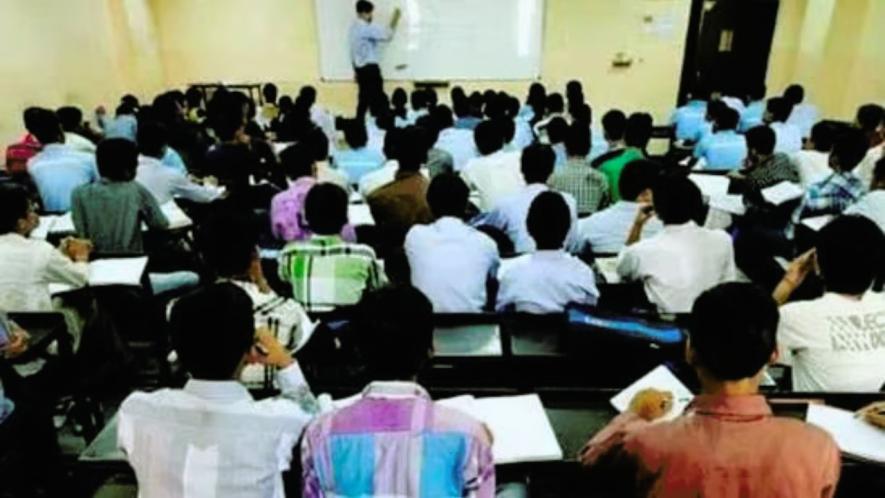Dark Side of Coaching Industry’s ‘Success Stories’

Representational Image. Image Courtesy: PTI
The recent tragic flooding of coaching centres in Delhi, leading to the untimely deaths of several aspirants, has starkly illuminated the dark underbelly of India’s coaching industry. This booming business model, built on selling success stories, has consequences that extend far beyond financial exploitation. These centres lure aspiring students and their parents with glamourised tales of triumph, masking a grim reality of commodification, governmental neglect, and a disregard for the true essence of education.
The coaching industry capitalises on a meticulously crafted illusion of guaranteed success. These success stories, often dramatised and selectively highlighted, turn dreams into a marketable commodity. Coaching centres prioritise profits over pedagogy, preying on the anxieties of parents and the aspirational dreams of students. This narrative is selective, focusing on the peaks of success while obscuring the valleys of toil, sacrifice, and failure that define the journey. The relentless pursuit of profit fosters a culture of competition, stress, and inequality, reducing students to mere customers whose dreams are exploited to fuel the industry’s bottom line.
A critical aspect of this issue is the clamour for prestigious jobs and the singularity of youth ambitions, driven by the lack of diverse job opportunities. Socio-economic barriers significantly shape the aspirations of Indian youth.
Limited availability of quality jobs creates a competitive environment where students are pressured to aim for a few prestigious positions. This phenomenon, termed “conditionally convergent aspirations,” occurs when socio-economic and cultural barriers limit the range of aspirations within homogeneous groups. Social immobility, coupled with structural barriers like caste, religion, and gender, constrains the dreams of many, leading to a narrow focus on certain job sectors as the only viable path to upward mobility.
However, can the profit-seekers be entirely blamed? The government’s apathy toward education significantly contributes to this problematic landscape. Insufficient funding, inadequate infrastructure, and a lack of focus on quality education create a void that coaching centres eagerly fill. The recent budget allocation for education, a mere 2.7% of the total budget, starkly reflects the government’s misplaced priorities. By neglecting its fundamental responsibility to provide quality education, the government has effectively ceded ground to profit-driven entities, allowing them to dominate and exploit the sector.
The consequences of this flawed system are profound. An entire generation of students is being conditioned to equate success with high test scores, often achieved through rote learning rather than genuine understanding.
The education system has become a passive observer, while coaching centres set the standards for success. This perpetuates social inequality, restricting access to quality education for marginalised communities and fostering a culture of competition and stress, ensuring that the right to education never becomes an equal right for all.
When society begins to misinterpret education as merely test scores or success, it loses sight of the true purpose of education: to cultivate individuals capable of living in harmony, caring for, and working with each other.
Education ensures that people understand the value of freedom, democracy, and collective action. In contrast, the coaching culture, with its narrow focus on higher scores, undermines these values. While education teaches us the virtues of growing together, the era of cut-throat competition redefines success as a function of time, leading students to prioritise activities that guarantee higher scores over holistic development. In other words, while education prepares one for citizenry, coaching prepares one for seeking solitary success.
Furthermore, the singularity of youth aspirations driven by limited job opportunities has significant social and economic repercussions. The lack of diverse career paths leads to heightened competition for a few positions, fostering stress and reducing the overall well-being of the youth. This perpetuates social inequality, as those from privileged backgrounds are better positioned to afford expensive coaching, enhancing their chances of securing these coveted jobs. This also ensures that people who ultimately get top jobs are not sympathetic to the wider needs of society.
The wedge between the haves and the have-nots widens, not only because it is only those who can afford the fees of coaching centres who get the coveted jobs but also because once they have the jobs, they are unable to work for society at large because they don’t understand the needs of people who are different from them.
To counter this troubling trend, we must redefine our understanding of success and challenge the profit-driven agenda of the coaching industry. A paradigm shift in education is imperative, one that values holistic learning, creativity, and critical thinking.
The government must step up, acknowledging its role in shaping the educational landscape and taking concrete steps to address systemic issues. Substantially increasing the budget allocation for education to improve infrastructure, provide better training for teachers, and integrate technology in classrooms will reduce the reliance on private coaching centres.
It is also important to implement policies to expand the economy and create diverse job opportunities across various sectors. This includes incentivising industries, supporting start-ups, and enhancing vocational training programs. Strengthening and enforcing anti-discrimination laws in education and employment to ensure equal opportunities for all, regardless of socio-economic background, is crucial. Developing targeted programmes to support students from the weaker sections and the marginalised communities, providing them with the resources and opportunities needed to succeed, and implementing regulations to ensure that coaching centres operate transparently and ethically, prioritising student welfare over profits are necessary steps. Moving beyond the façade of success stories requires a concerted effort to build an education system that truly empowers students.
The coaching industry, with its polished narratives of success, may continue to thrive, but the time has come for us to look beyond the glamour. We must strive for an education system that nurtures true learning and empowers individuals, rather than exploiting their aspirations for profit. Only then can we dismantle the illusion and build a future where education fulfils its true purpose, fostering a society that values equality, justice, and the boundless potential of its youth.
In addition to the structural changes within the education system, addressing India’s job crisis requires a nuanced understanding of the broader economic context.
Combining these insights with the earlier discussion on the education system and coaching industry, it becomes clear that a multifaceted approach is essential. The government must play a proactive role in not only reforming the education system and regulating coaching centres but also in creating a diverse and inclusive job market. This holistic approach will ensure that the aspirations of the youth are not constrained by systemic barriers but are supported by a reality that offers genuine opportunities for growth and success.
By addressing the root causes of dependency on coaching centres and creating a robust job market, we can build a future where education is a tool for empowerment and not a mere commodity for profit. This is the legacy we must strive for, ensuring that the aspirations of our youth are nurtured by a reality that supports and celebrates their potential.
The recent tragic flooding incident is a wake-up call for society to question the commodification of education and the profit-driven agendas that have overshadowed true learning. We must seize this moment to advocate for a transformative change in our education system, one that honours the holistic development of individuals and upholds the values of democracy, freedom, and collective growth.
The writers are Associate Professors at the Zakir Husain Delhi College, University of Delhi. The views are personal.
Get the latest reports & analysis with people's perspective on Protests, movements & deep analytical videos, discussions of the current affairs in your Telegram app. Subscribe to NewsClick's Telegram channel & get Real-Time updates on stories, as they get published on our website.
























